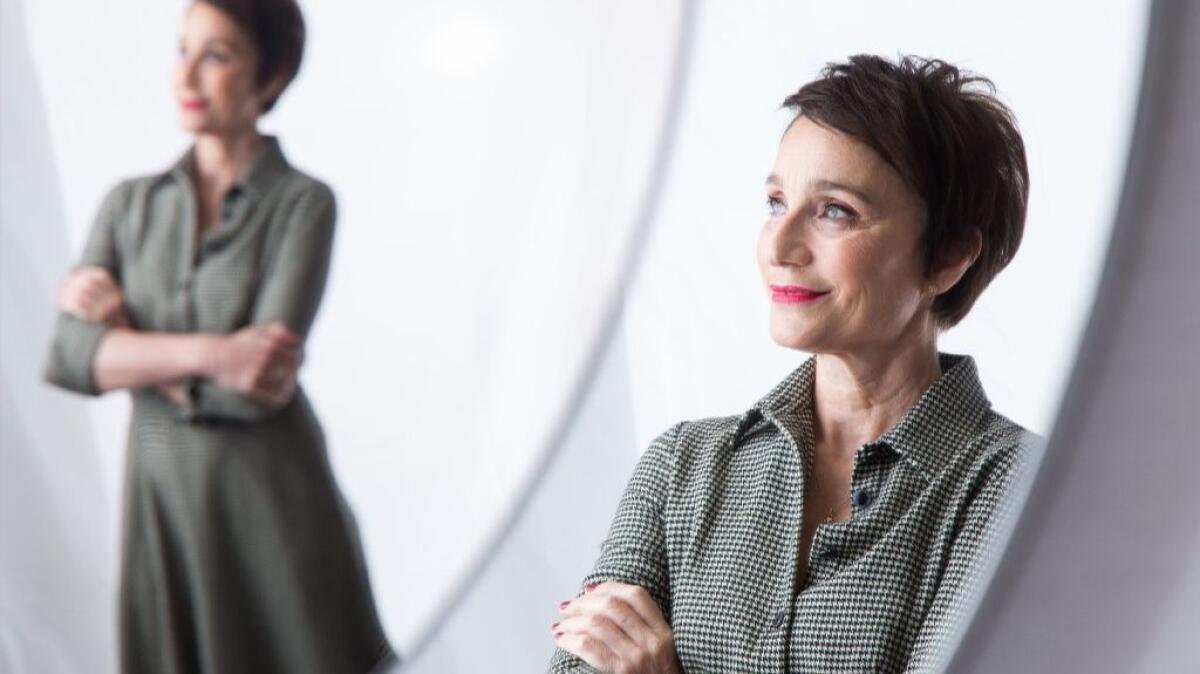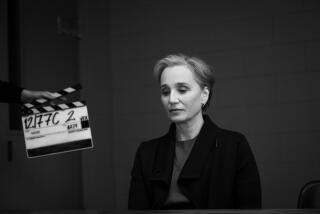‘Darkest Hour’ mirrors modern-day dangerous times, says Kristin Scott Thomas

- Share via
“Regal” may be the word to describe Kristin Scott Thomas as she sits in the warmly lighted lobby of New York City’s Lowell Hotel sipping an espresso she ordered in French. Also “cosmopolitan,” “posh,” “chic”: An animal-print coat drapes across her shoulders like an exotic cape.
“Words are important to me,” the actress, most famous, perhaps, for her 1996 Oscar-nominated role in “The English Patient,” says, sometimes trying on several before settling on one she likes.
It was the script along with her admiration for the director and the woman she would be portraying that prompted Scott Thomas to overcome her initial reluctance to take the role as Winston Churchill’s wife, Clementine, in Joe Wright’s “Darkest Hour,” alongside a remarkable turn by Gary Oldman as Churchill. The film depicts Churchill’s early weeks as prime minister, his bold decision to stand firm against the Nazis and launch Operation Dynamo, the risky rescue of soldiers from Dunkirk, and points to the role Clementine’s support played at a pivotal moment in history.

Gary Oldman plays Winston Churchill as he becomes England’s prime minister in “Darkest Hour.”
WATCH: Video Q&A’s from this season’s hottest contenders »
Scott Thomas, as Clemmie, isn’t on the screen that much, but she makes the most of every moment, turning in a nuanced, elegant and deeply researched performance (she devoured biographies, consulted historians and spoke with surviving relatives) that adds emotional weight and depth.
It’s a rousing movie.
I think we see our predicament at the moment. We crave somebody like [Churchill] to make brave decisions for the people rather than from an egotistical point of view. He was highly educated, and he used his knowledge, his brain, his heart.
It’s not for us to tell you what to think. If you want to see something about Irump — or Brexit or North Korea — in there, you can.
— Emma Thompson
Do you see the film as a commentary on Trumpism?
It’s about an extraordinary man at an extraordinary, dangerous time, and we are in an extraordinary, dangerous time, so there’s a mirroring. But it’s not for us to tell you what to think. If you want to see something about Trump — or Brexit or North Korea — in there, you can.
How did you approach the role?
It’s terrifying when you have this historical character because you have to get it right. And she is the granny of people I like, so you don’t want to be disrespectful. But we have to tell the story rather than the history, get across the feelings more than the facts. That’s when the fun happens. Walking onto set and seeing not Gary Oldman, but Winston Churchill. You become a Clemmie. He becomes a Winston. It’s not the Winston or Clemmie, but we are creating a symbol or ghost of them.
You’ve walked away from acting in films at times. Why?
One reason recently was I counted the number of days I’d been pretending to be someone else and it was more days per year than I was me. I wasn’t getting a thrill from making films anymore. So I stopped, went onstage and reconnected with the audience and the pleasure of performance and words. I’m not an articulate person so I love to be swept up in other people’s language.
In “Darkest Hour,” Clemmie notes the sacrifices families make for a parent’s career. Do you relate?
Definitely. It’s particularly difficult for mothers to raise children, be a wife and be somebody who has personal satisfaction in what they do. Being productive is a beautiful thing. I feel like that onstage and in the films I’ve done recently.
What about the Harvey Weinstein allegations?
It’s depressing.
What’s your take?
It’s been going on forever, and it isn’t just Hollywood. This sexual abuse is unbearable and should be stamped out, but there’s also the abuse through just the power of the man in charge, which I’ve suffered from, being bullied in subtle ways. A question of personal space, a controlling hand on the back of your neck, a director or actor who feels he has the right to hold my face in a particular way, like a child. You want to punch them. What’s great now is that this is being said. I just wish we’d start looking at it in a more profound way.
It seems like that’s happening.
Yes. Thank God. The past month has been exhausting with all the details. I really don’t want the details, thank you very much. Not at my breakfast. It’s terrible for these women, and I’m amazed at how brave they are to say these things. But I want the debate to go further now.
More to Read
From the Oscars to the Emmys.
Get the Envelope newsletter for exclusive awards season coverage, behind-the-scenes stories from the Envelope podcast and columnist Glenn Whipp’s must-read analysis.
You may occasionally receive promotional content from the Los Angeles Times.








